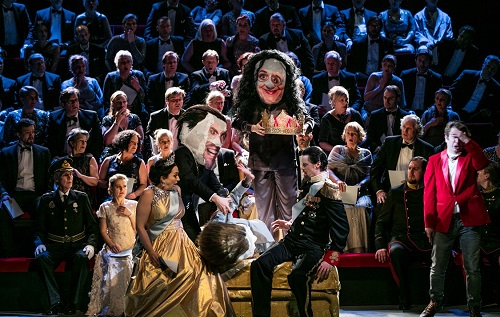 Sweden Ambroise Thomas, Hamlet: Soloists, Gothenburg Opera Orchestra, Chorus and Extra Chorus, Henrik Schaefer (conductor), Gothenburg Opera main stage, 9.4.2016. (NS)
Sweden Ambroise Thomas, Hamlet: Soloists, Gothenburg Opera Orchestra, Chorus and Extra Chorus, Henrik Schaefer (conductor), Gothenburg Opera main stage, 9.4.2016. (NS)
Cast:
Claudius, King of Denmark: Paul Whelan
Queen Gertrude: Katarina Karnéus
Hamlet: Thomas Oliemans
Polonius: Peter Loguin
Ophelia: Ditte Højgaard Andersen
Laertes: Joachim Bäckström
Horatio: Anton Ljungqvist
Marcellus: Henrik Andersson
The Ghost: Björn Larsson (voice) and Lars Hjertner (mime)
First Gravedigger: Anton Ljungqvist
Second Gravedigger: Ingemar Andersson
Players: David Lundqvist, Tobias Ahlsell, Anders Wängdahl
Production:
Gothenburg Opera
Director: Stephen Langridge
Set and costume design: Samal Blak
Lighting design: Paul Pyant

Nearly 150 years after its premiere in Paris, Ambroise Thomas’ dramatic masterpiece Hamlet finally arrived in Sweden with the Gothenburg Opera’s new production. Fortunately, Stephen Langridge’s superb production is worth the wait. With its compelling plot, expressive music and excellent libretto this opera deserves a much more prominent place in the repertoire.
Mr Langridge has created a production that ought to become a modern classic alongside his sublime Marriage of Figaro. He has placed the story in a modern setting (in this case contemporary Denmark, complete with CCTV) while still respecting and emphasising the story and the characters. The inclusion of the Act 2 duet between Claudius and Gertrude improves the balance and allows the plot to focus on the two couples (Hamlet and Ophelia, Claudius and Gertrude) at the core of the drama. At the same time, this private drama is played out in a sick society run by amoral and hypocritical politicians and riven with social conflict.
Henrik Schaefer’s conducting captured the audience’s interest from the first bars. He was a very convincing advocate for the qualities of Thomas’ music, balancing the various colours in the orchestra beautifully. Samal Blak’s evocative sets work perfectly with this vision and also provide reflective surfaces so that the singers are clearly audible whichever direction they are facing, allowing more naturalistic acting. Paul Pyant’s atmospheric lighting is never more beautiful than during Ophelia’s final moments at the end of Act 4.
Though the cast is reduced compared with Shakespeare’s play, the supporting roles are nevertheless important and were well cast in this production. Laertes (Joachim Bäckström) was moving as Ophelia’s brother with his expressive tenor. The Gravediggers (Anton Ljungqvist and Ingemar Anderson) gave us some hilarious if morbid slapstick at the beginning of Act 5. Most of all, the Ghost (mimed by Lars Hjertner, sung with dark resonance by Björn Larsson offstage) was utterly gripping. The Ghost’s first appearance in Act 1 was a directorial tour-de-force, as he was at first only visible on a CCTV monitor showing an otherwise empty area of the stage; only after Horatio and Marcellus had left Hamlet on his own was the Ghost visible onstage.

King Claudius (Paul Whelan) gave a convincing portrait of a two-faced politician; the setting of his Act 1 speech looked like the acceptance speech of a US presidential candidate, complete with a beaming First Lady-to-be. Outwardly charming and statesmanlike, he was privately more brutal and depraved, as shown in the Act 2 duet with Gertrude. Mr Whelan’s vocal delivery heightened this contrast, with the smooth, rounded sound of Act 1 giving way to a crueller, angrier bass in the Act 2 duet.
Queen Gertrude (Katarina Karnéus) has the perfect gleaming dark mezzo for her part. She convincingly portrayed the emotional rollercoaster that her outwardly glamorous character goes through: paranoia that someone has discovered the secret of her crime to concern for her son’s mental stability turning to terror and pleading when he holds a gun to her head and reveals that he knows that his father was murdered and then kills Polonius in front of her.
Ophelia (Ditte Højgaard Andersen) at first seemed to lack power in her lower register but my doubts were quickly blown away by her lyrical and expressive singing and shimmering top register. Her acting and singing combined to make her interpretation utterly convincing from the first love duet with Hamlet to her haunting madness and suicide in Act 4. Ms Højgaard Andersen did more than justice to the Nordic melancholy of the music.
Thomas Oliemans (Hamlet) was however the outstanding member of the cast. His portrayal of the deeply troubled young man was gripping from his first scene, and his versatile baritone was equally at home in expressive melodies and introspective soliloquies. His “To be or not to be” in Act 3 was stunning with its quiet dynamics, and he was thrilling in his rage and madness (or is it calculated deception?) when the Players re-enact the murder of his father and when he confronts his mother. Most affecting of all was his devastation in Act 5 as he regrets driving Ophelia to the same madness he suffers from himself, and then (in the Paris ending) is made King though his “heart is in a tomb”.* This was an unforgettable operatic experience.
Niklas Smith
*This production alternates between the original Paris ending where Hamlet kills Claudius and is declared King (often erroneously described as a happy ending), and the alternative ending that was written for the opera’s Covent Garden premiere, where Hamlet expires over Ophelia’s dead body.
The Paris ending is given on the following dates: 9, 17, 23 April, 8, 15, 21 May.
The London ending is given on the following dates: 15, 20, 27 April, 11, 19 May.